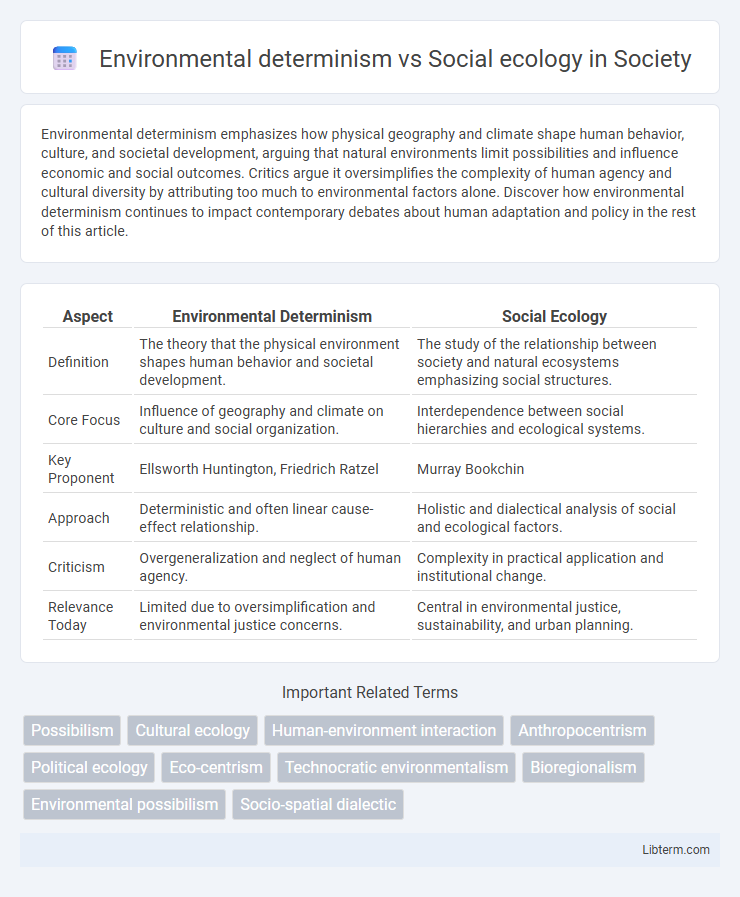Environmental determinism emphasizes how physical geography and climate shape human behavior, culture, and societal development, arguing that natural environments limit possibilities and influence economic and social outcomes. Critics argue it oversimplifies the complexity of human agency and cultural diversity by attributing too much to environmental factors alone. Discover how environmental determinism continues to impact contemporary debates about human adaptation and policy in the rest of this article.
Table of Comparison
| Aspect | Environmental Determinism | Social Ecology |
|---|---|---|
| Definition | The theory that the physical environment shapes human behavior and societal development. | The study of the relationship between society and natural ecosystems emphasizing social structures. |
| Core Focus | Influence of geography and climate on culture and social organization. | Interdependence between social hierarchies and ecological systems. |
| Key Proponent | Ellsworth Huntington, Friedrich Ratzel | Murray Bookchin |
| Approach | Deterministic and often linear cause-effect relationship. | Holistic and dialectical analysis of social and ecological factors. |
| Criticism | Overgeneralization and neglect of human agency. | Complexity in practical application and institutional change. |
| Relevance Today | Limited due to oversimplification and environmental justice concerns. | Central in environmental justice, sustainability, and urban planning. |
Introduction to Environmental Determinism
Environmental determinism posits that physical environment, including climate and geography, shapes human culture, behavior, and societal development. This theory emphasizes the role of natural conditions as the primary drivers of social and economic differences among human populations. Critics argue that environmental determinism oversimplifies complex human-environment interactions, often neglecting cultural, political, and technological factors.
Foundations of Social Ecology
Foundations of Social Ecology challenge environmental determinism by emphasizing the dialectical relationship between humans and their environment rather than viewing nature as a deterministic force. Social ecology highlights how social hierarchies, economic systems, and cultural practices shape environmental conditions and human interactions with nature. This framework proposes ecological issues are rooted in social problems, advocating for restructuring society based on principles of decentralization, direct democracy, and ecological sustainability.
Historical Context and Origins
Environmental determinism originated in the late 19th century, grounded in the belief that climate and geography shape human behavior and societal development, heavily influenced by geographers like Friedrich Ratzel and Ellen Churchill Semple. Social ecology emerged in the 1960s with Murray Bookchin, emphasizing the interdependence between social structures and ecological systems, critiquing environmental determinism for ignoring human agency and social factors. The historical context reflects a shift from deterministic, nature-centric explanations to integrative approaches recognizing socio-political influences on environmental relationships.
Key Theoretical Differences
Environmental determinism asserts that physical environment, especially climate and geography, shapes human behavior and societal development with limited human agency. Social ecology emphasizes the interaction between social systems and environmental conditions, arguing that social hierarchies and human choices drive ecological crises. Key theoretical differences lie in environmental determinism's focus on environmental causality versus social ecology's emphasis on social structures and power dynamics influencing environmental outcomes.
Human-Nature Relationship Perspectives
Environmental determinism emphasizes that human behavior and societal development are primarily shaped by physical environmental factors such as climate, geography, and natural resources. In contrast, social ecology views the human-nature relationship as a dynamic interaction where social structures, cultural practices, and power dynamics influence environmental outcomes. Understanding these perspectives is crucial for developing sustainable policies that consider both ecological constraints and social justice.
Case Studies: Real-World Applications
Environmental determinism shapes urban planning in arid regions by emphasizing climate constraints, as seen in ancient Mesopotamian irrigation techniques that optimized water management according to environmental limitations. Social ecology influences modern community-based sustainability projects, such as Detroit's urban farming initiatives, which address social inequalities and promote environmental stewardship through grassroots organization. These case studies illustrate how environmental and social factors interplay, guiding adaptive strategies in diverse geographic and social contexts.
Critiques and Controversies
Environmental determinism faces criticism for oversimplifying complex human-environment interactions by attributing societal development primarily to physical geography, ignoring cultural and social factors. Social ecology challenges this view by emphasizing the role of social structures and human agency in shaping environmental outcomes, highlighting the interplay between society and nature rather than one-way environmental causation. Controversies arise over the reductionism in environmental determinism and debates on how power dynamics and social inequalities influence ecological degradation within social ecology frameworks.
Impacts on Environmental Policy
Environmental determinism asserts that physical environments, such as climate and geography, primarily shape human behaviors and societal development, influencing policies that emphasize adaptation to natural constraints. Social ecology argues that social structures, power relations, and human interactions with the environment drive environmental degradation, promoting policies aimed at addressing social inequality and ecological justice. These contrasting perspectives impact environmental policy by framing either the environment as a limiting factor or human society as the agent of change, guiding whether policies prioritize natural resource management or social reform.
Modern Relevance and Evolving Views
Environmental determinism, once dominant in geographic thought, posits that physical environments shape human behavior and societal development, influencing contemporary research in climate impact and urban planning. Social ecology challenges this by emphasizing human agency, social structures, and environmental justice, shaping modern policies aimed at sustainable development and equitable resource distribution. Evolving views integrate both perspectives through interdisciplinary approaches, recognizing complex interactions between environment, society, and technology in addressing global challenges such as climate change and urbanization.
Conclusion: Bridging the Divide
Environmental determinism emphasizes how physical geography shapes human behavior and societal development, often overlooking cultural and social dynamics. Social ecology highlights the complex interactions between social structures and environmental contexts, advocating for more holistic approaches to sustainability. Bridging the divide requires integrating geographical factors with social processes, fostering interdisciplinary frameworks that address environmental challenges through both ecological and sociocultural lenses.
Environmental determinism Infographic

 libterm.com
libterm.com